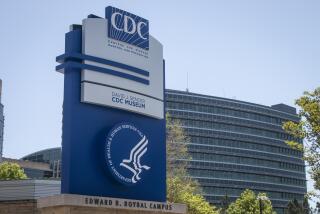Wilson Holds Off Cut of Health Care Funds
- Share via
SACRAMENTO — Gov. Pete Wilson on Wednesday refused, at least temporarily, to activate a controversial “poison pill” law that could have terminated $898 million in state aid for local indigent health care services.
In doing so, Wilson assured financially stressed counties that they will continue receiving the state funds, at least until a relatively obscure board known as the Commission on State Mandates tries to find a permanent way to resolve a complicated set of issues involving state funding of county social service programs.
“This means that a fiscal crisis for counties has been averted for now,” the governor said.
Wilson’s ruling will preserve $330 million that Los Angeles County is expecting to receive during the next fiscal year. The state Department of Finance estimates that the amounts involved for other Southern California counties include $49 million for Orange, $12 million for Ventura, $23 million for San Bernardino, $25 million for Riverside and $45 million for San Diego.
Administration officials said, however, that depending on what the commission decides, the issue could return as a nagging budget problem for Wilson and the Legislature.
The “poison pill” problem arose with a state Supreme Court ruling last month. The court decided, in a case brought by San Diego County, that the state owed counties potentially millions of dollars for unreimbursed payments the counties had made for health care services provided to indigent adults.
What at first appeared to be a welcome windfall for counties struggling to balance their budgets quickly became a Catch-22. In 1991, Wilson and the Legislature had adopted a measure, called the “poison pill,” which provided that if San Diego won its court case over the health care payments, the state would stop paying newly increased motor vehicle license fees to counties.
The state officials took their action to discourage other counties from joining San Diego’s lawsuit.
Suddenly, the counties were faced with losing $898 million next year in license fees that are supposed to go to support health care and social service programs.
The Supreme Court’s decision became final Wednesday, and Wilson agreed not to activate the poison pill. He did so on the grounds that the high court’s decision was not a “final court ruling” on the issue of the health care payments.
The court had directed the Commission on State Mandates to determine how much money San Diego County should be awarded. Until the commission rules, the “poison pill” provision will not be triggered, Wilson said.
A decision “may take a few months. We haven’t got the paperwork from San Diego,” said Gary Hori, the commission’s attorney.
The little-known commission is made up of statewide elected officials and members appointed by Wilson. The panel is supposed to decide whether a local government is entitled to reimbursement by the state when the state mandates certain services and does not provide funds to pay for them.
Administration officials, who asked not to be identified, said the commission could rule that the county’s claims are valid and the entire issue could be reignited and re-fought.
But in a brief interview, Wilson said he believed that San Diego’s claims for repayment, which were closely watched by other counties, already had been offset by other sources of revenue, including the additional motor vehicle license fees.
“My own feeling is that whatever claim they might have felt they had has been offset,” the governor said.
The governor’s announcement was praised by representatives of counties. “We think the governor absolutely made the correct decision in not activating the ‘poison pill,’ ” said Margaret Pena of the county supervisors association.
She said it gave Wilson, the Legislature and counties “the opportunity to work to try to find a solution to these issues created by the court’s decision.”
More to Read
Get the L.A. Times Politics newsletter
Deeply reported insights into legislation, politics and policy from Sacramento, Washington and beyond. In your inbox twice per week.
You may occasionally receive promotional content from the Los Angeles Times.








